From October 23 to 24, 2023, the Center for International Security and Strategy (CISS) of Tsinghua University and the National Committee on US-China Relations (NCUSCR) jointly organized the U.S.-China People’s Dialogue at the Citibank Headquarters in New York, USA. In order to have a truly in-depth, quality, and informative dialogue, both sides carefully selected representatives from all walks of life to participate in the Dialogue for exchanges, covering a wide range of fields such as education, literature, business, climate change, art, overseas Chinese, philanthropy, artificial intelligence (AI), insurance. Through sharing stories and exchanging ideas, the participants explained the theme of “U.S.-China People’s Dialogue - Our Stories, Our Ideas” in a profound manner.
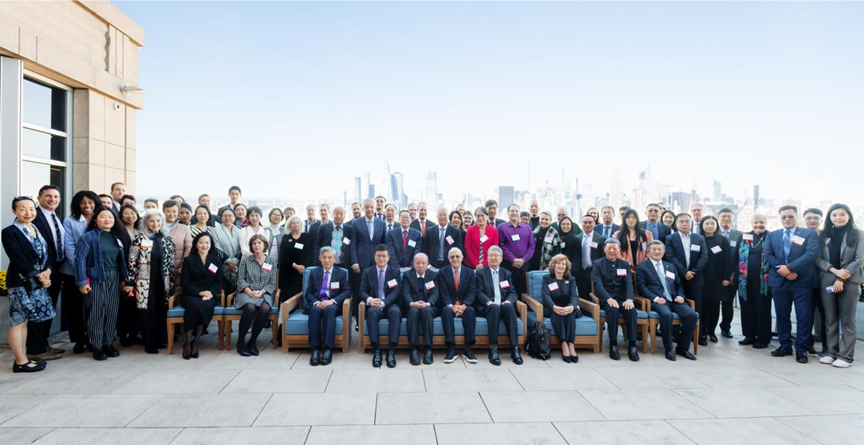
Group Photo of Participants
On October 23, the Dialogue kicked off with welcoming remarks by Da Wei, Director of CISS, and Steve Orlins, President of the NCUSCR. At the beginning of the Dialogue, Lu Mai, former Vice Chairman of China Development Research Foundation, and Robert Rubin, former Secretary of the U.S. Treasury, engaged in a conversation about China-U.S. relations. Then one by one, representatives from various fields started the dialogues on the examination of the cognition of their own industries and identities and the sharing of their deep insights into international relations, and put forward corresponding suggestions for China-U.S. cooperation.
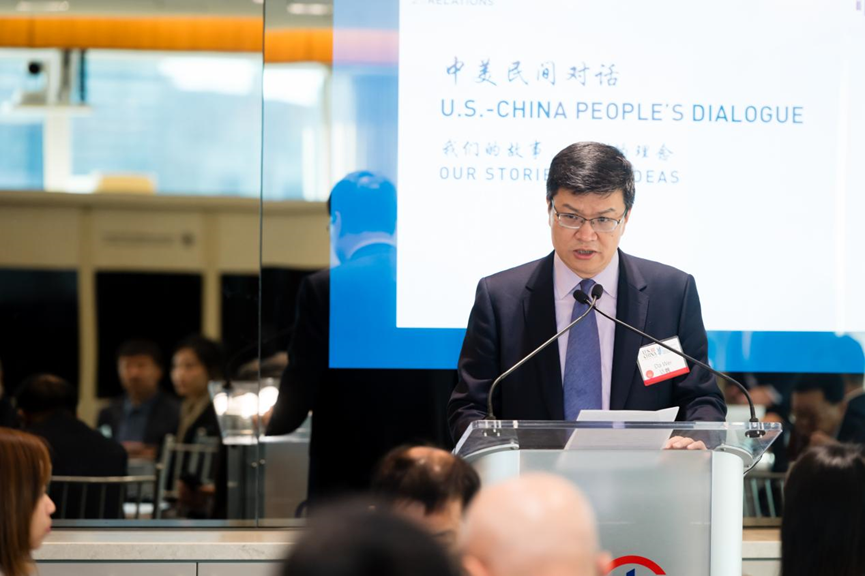
Welcoming Remark by Da Wei
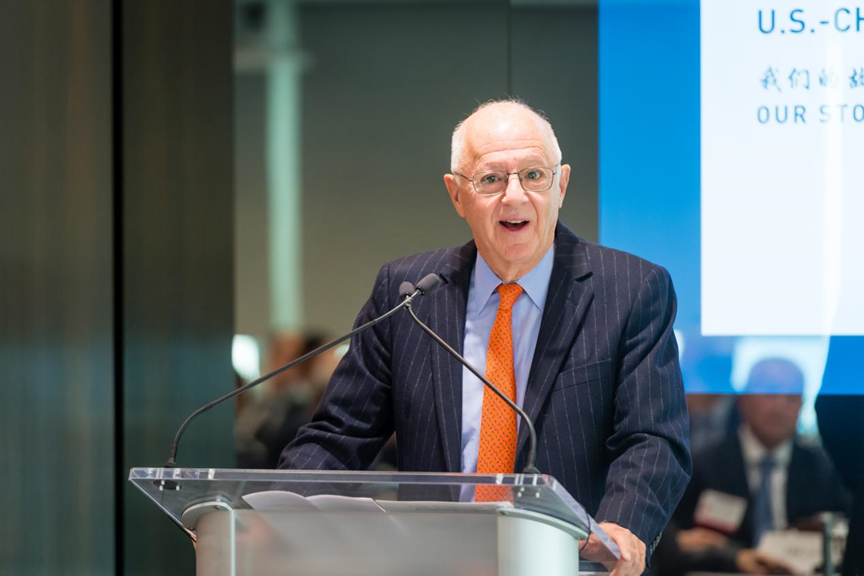
Welcoming Remark by Steve Orlins

Dialogue between Lu Mai and Robert Rubin
In the higher education session, William Kerby, T. M. Chang Professor of Chinese Studies at Harvard University, and Xue Lan, Dean of Schwarzman College of Tsinghua University, engaged in a dialogue on higher education, discussed how to promote the enhanced exchanges between students and scholars of the two countries, and proposed that colleges and universities and scholars should play a greater role in facilitating exchanges between the two sides.

Dialogue between Xue Lan and William Kerby
In the literary arts session, Hao Jingfang, Hugo Award winner and science fiction writer, and Peter Hessler, author of Country Driving, shared how they have been inspired by their own experiences to create a literary spark in their thoughts.
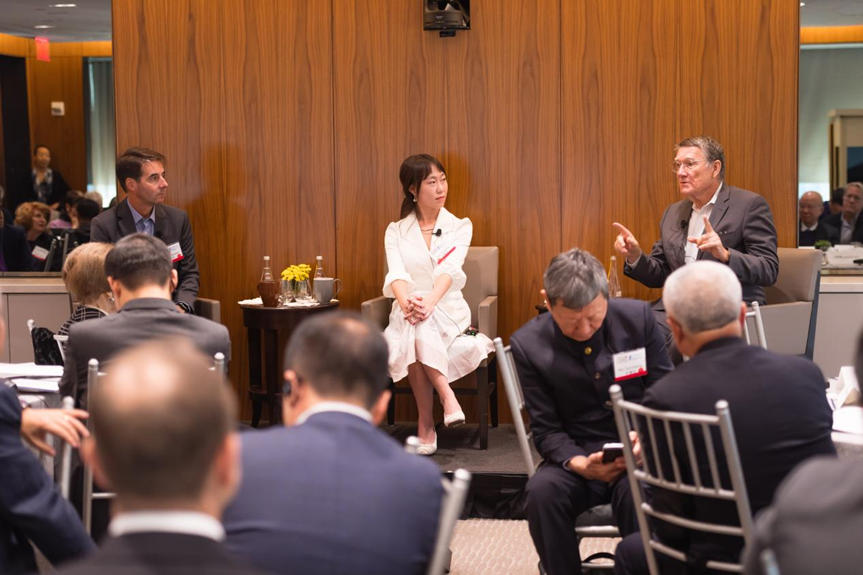
Dialogue between Hao Jingfang and Peter Hessler
In the business session, Merit Janow, Independent Chair of the MasterCard Board of Directors, engaged in a dialogue with Wang Boming, Director General of China Securities Market Research and Design Center. They shared the important role of business as the bond between the U.S. and China, and raised the importance of promoting improvement and governance of market rules.
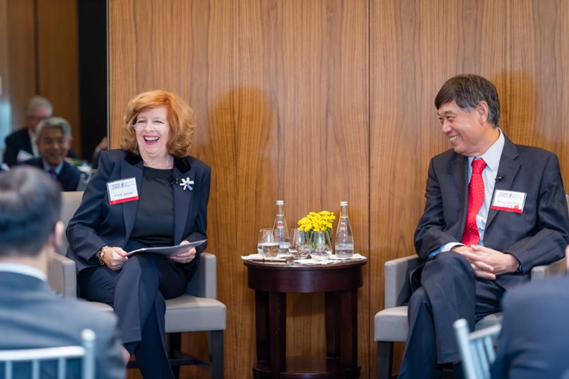
Dialogue between Wang Boming and Merit Janow
During the lunch, Zhu Min, former Deputy Governor of the People’s Bank of China, delivered a keynote speech, introducing the current basic situation of China’s economy and new opportunities for development and reform. With detailed data and abundant cases, he introduced China’s current economic development transformation in detail, especially the efforts and progress made in the fields of new energy production and carbon neutrality.
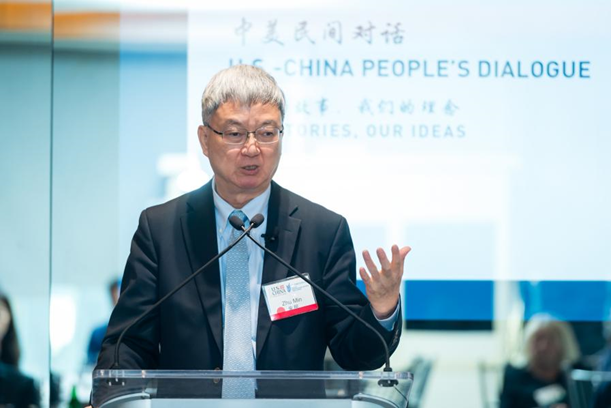
Keynote Speech by Zhu Min
The afternoon agenda covered climate change, visual arts, stories of overseas Chinese, and philanthropy sessions. In the climate change session, Teng Fei, Deputy Director of the Institute of Energy, Environment and Economy of Tsinghua University, and Deborah Seligsohn, Assistant Professor of Villanova University, had an in-depth discussion on how the two countries can work together to address climate change and strengthen scientific research cooperation in non-sensitive areas.
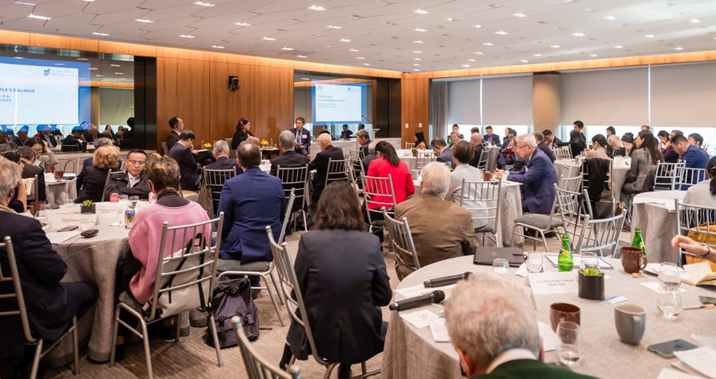
Dialogue between Teng Fei and Deborah Seligsohn
In the visual arts session, Cai Guoqiang, a renowned artist, and Stephen Little, Curator of Chinese Art at the Los Angeles County Museum of Art, discussed how the arts, as an important component in carrying cultural diplomacy, play an indispensable role in promoting mutual understanding and bridging the gap between U.S.-China relations.
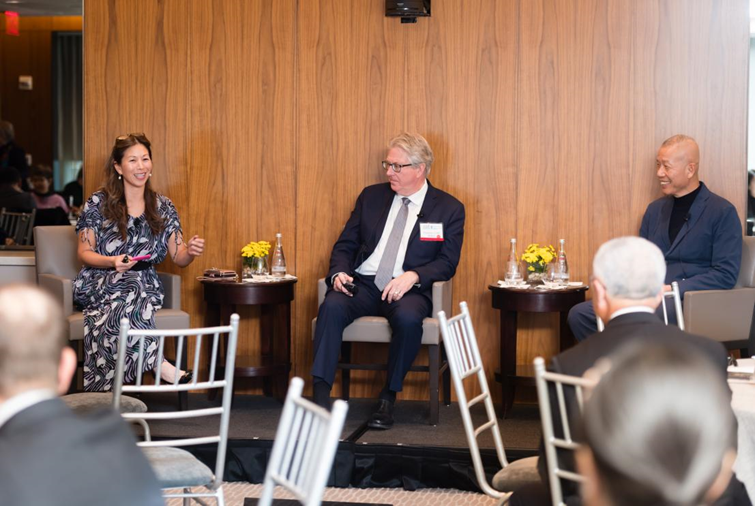
Dialogue between Cai Guoqiang and Stephen Little
Angela Chao, overseas Chinese representative and Chair and CEO of Foremost Group, and Ming Hsieh, CEO of Fulgent Genetics, recounted the stories of their parents as first-generation immigrants to the U.S. and their own stories of how they, as second-generation immigrants, have built bridges between the U.S. and China. They suggested that the differences between China and the U.S. are so deeply rooted that there is no need to force consistency, but that it is necessary to promote mutual understanding through exchanges and dialogues.
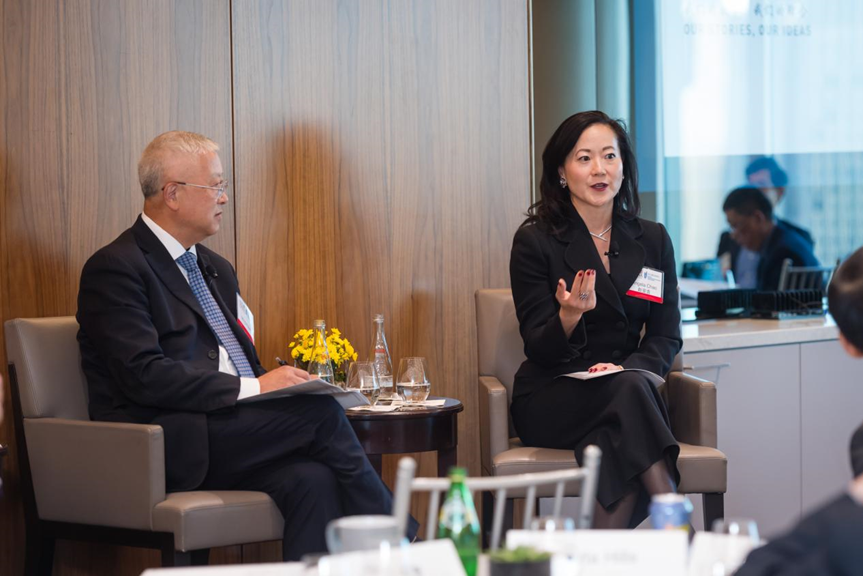
Dialogue between Angela Chao and Ming Hsieh
The philanthropy session featured a dialogue between Niu Gensheng, Founder and Honorary President of Inner Mongolia Lao Niu Foundation, and Louise Richardson, President of Carnegie Corporation of New York, about the important role the philanthropic community plays in fostering U.S.-China relations. Since the U.S. and China are the world’s largest economies, the philanthropic communities of the two countries have much to offer in advancing global, national, and peoples’ interests.
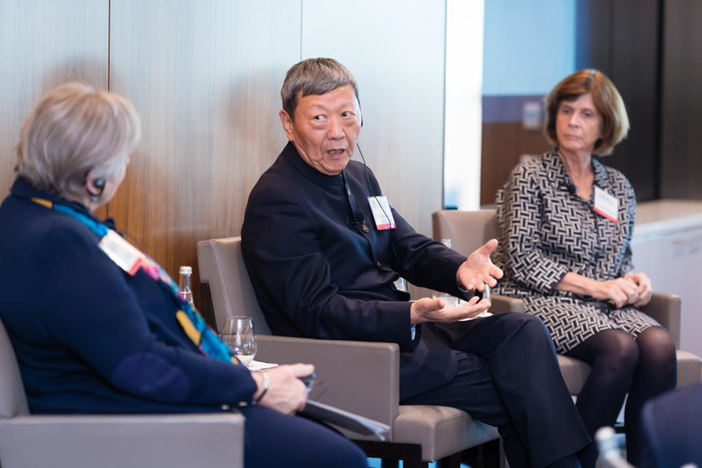
Dialogue between Niu Gensheng and Louise Richardson
To celebrate the success of the Dialogue, Ambassador Huang Ping, Consul-General of the Consulate General of the People’s Republic of China in New York, was invited to attend the gala dinner and delivered a speech, mentioning his recognition of the U.S.-China People’s Dialogue and his expectation for a smooth and positive development of U.S.-China relations in the future.
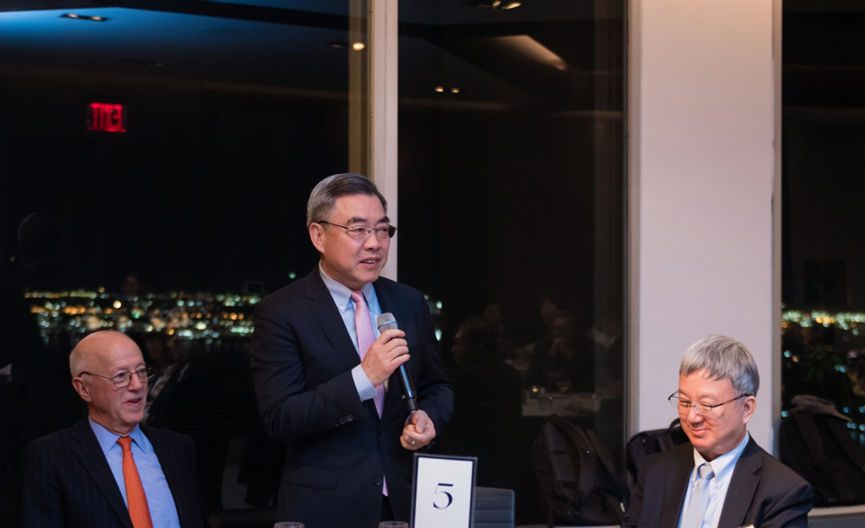
Speech by Huang Ping
On October 24, sessions about enterprise development, people’s voices, AI, insurance/service industries, and suggestions to U.S. and Chinese governments were held. In the enterprise session, Cao Dewang, Founder and Chairman of Fuyao Glass Industry Group, and Ernie Thrasher, Founder and CEO of Xcoal Energy, discussed the challenges of founding an enterprise in the international market, stated the stories of investing in factories overseas despite difficult times, and analyzed the current changes in the U.S.-China business environment.
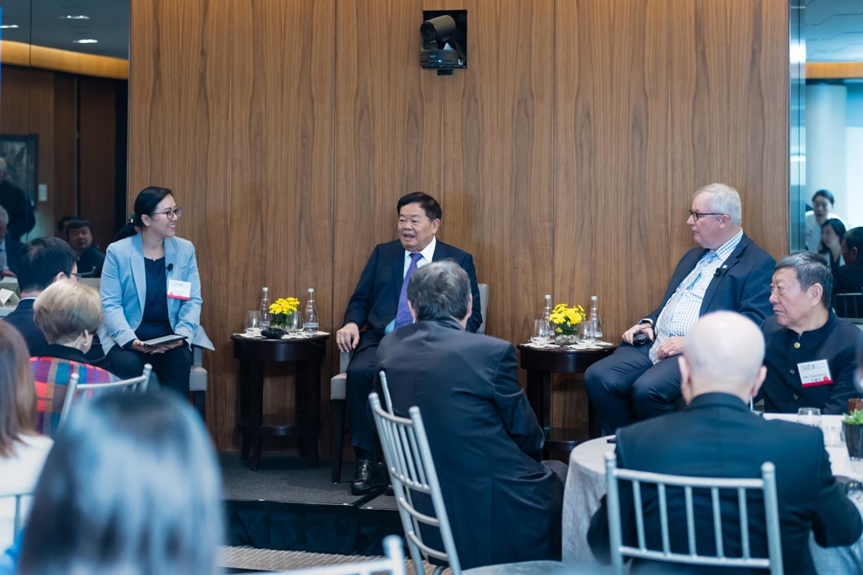
Dialogue between Cao Dewang and Ernie Thrasher
In the people’s voices session, Finn Murphy, an American long-haul truck driver and writer, and Wang Jibing, a Chinese deliveryman and poet, shared their experiences under different identities and the kindness and warmth they have felt in their lives. Expanding the discussion of trivial matters of life to U.S.-China relations, they explained from the perspective of “people in a hurry” that the biggest cause of misunderstanding between China and the United States is the distance.
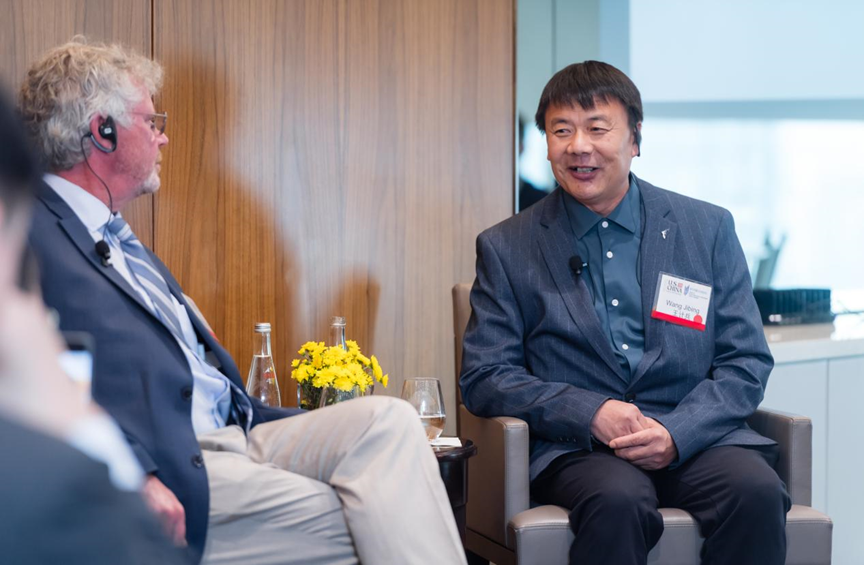
Dialogue between Finn Murphy and Wang Jibing
Experts from the AI and insurance industries also had an in-depth discussion on related topics. Dialogists Jim Breyer, Founder and CEO of Breyer Capital, and Zhang Huyue, Professor of Global Law at New York University, discussed how to expand cooperation between China and the U.S. on technology governance.
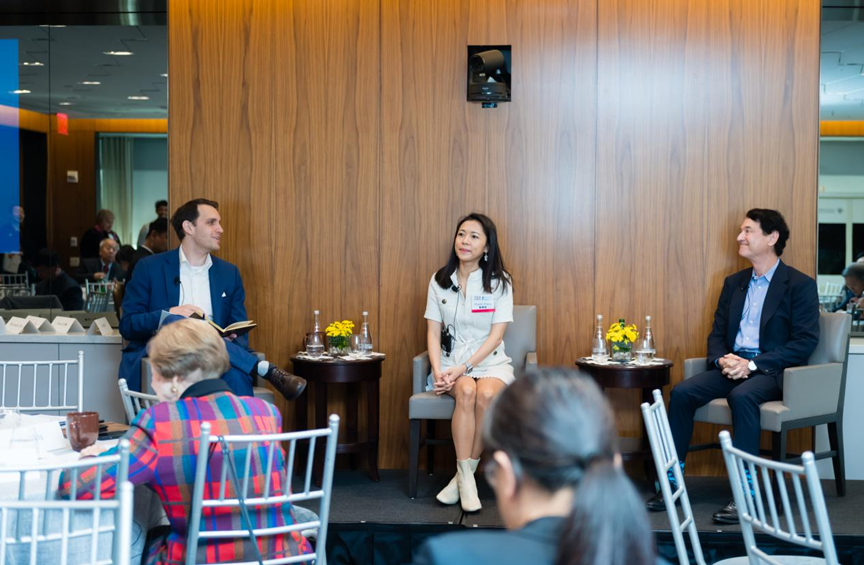
Dialogue between Jim Breyer and Zhang Huyue
From perspectives of the historical trajectory and future picture of the insurance industry development, Chen Dongsheng, Founder, Chairman, and CEO of Taikang Life Insurance, and Evan Greenberg, Chairman and CEO of Chubb Limited, discussed that the reverse flow of de-globalization, as a temporary phenomenon of the current geopolitical situation, will not last for a long time, and that it is only a matter of time for the difficulties and challenges between China and the United States. They believed that for civil exchange and business investment, it is imperative to seize the opportunity and grasp certainty among uncertainties.
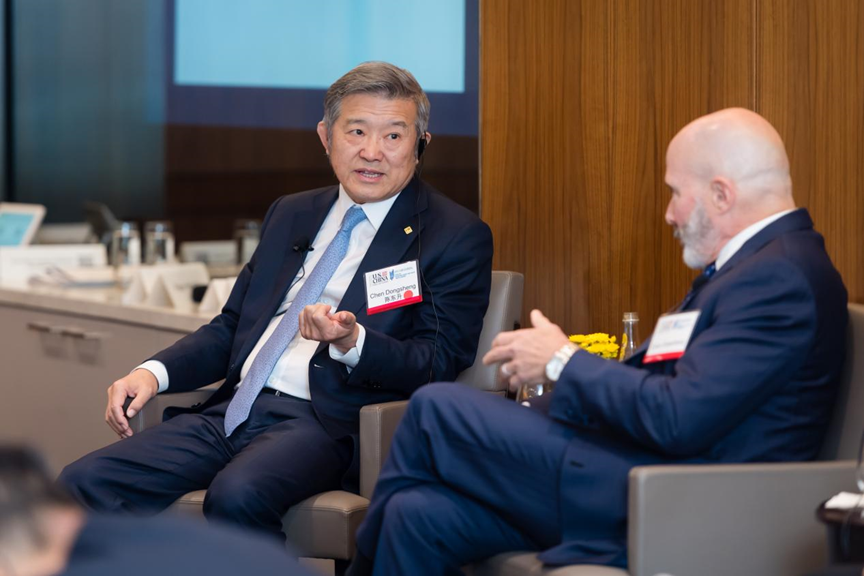
Dialogue between Chen Dongsheng and Evan Greenberg
At lunchtime, Tom Friedman, a columnist for The New York Times, delivered a speech, exchanging with the guests his views on the rebuilding of mutual trust between China and the United States and some international hot topics.
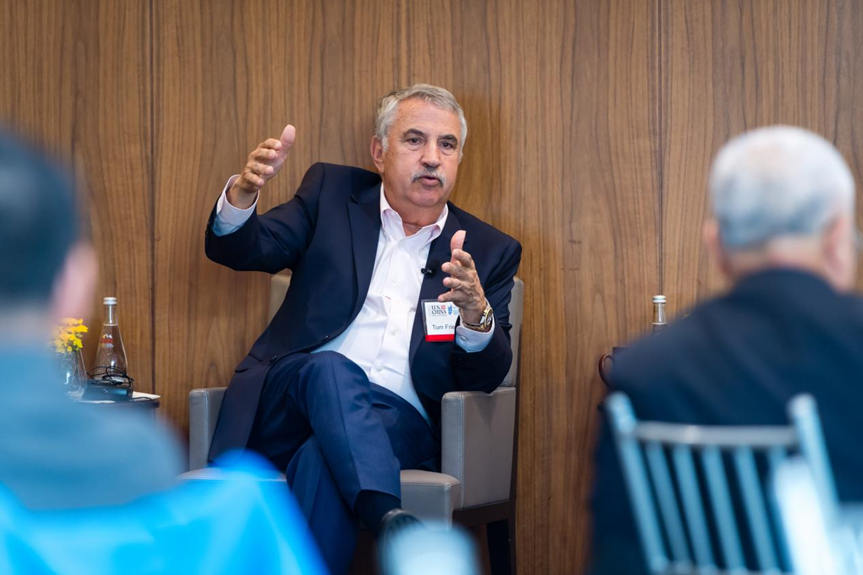
Keynote Speech by Tom Friedman
Toward the end of the Dialogue, the guests put forward suggestions on U.S.-China relations, including resuming direct flights between the two countries as soon as possible and encouraging more people-to-people exchanges, renewing the agreement on scientific and technological cooperation, and motivating scholars of the two countries to strengthen cooperation on climate change, public health, and so on.
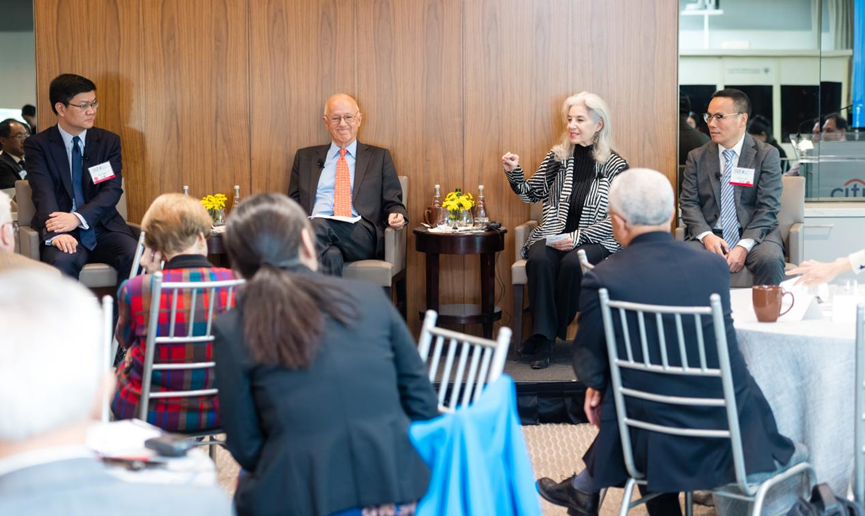
Dialogue between Da Wei, Steve Orlins, Jan Berris, and Chen Qi
On the evening of October 24, guests were invited to attend the annual dinner party of the NCUSCR. Chinese Ambassador to the United States Xie Feng attended the dinner party, read President Xi Jinping’s congratulatory letter, and delivered a speech. The NCUSCR presented an award to Henry Kissinger, former U.S. Secretary of State for his excellent contributions to the development of U.S.-China relations. Nearly 400 people attended the party, including Henry Kissinger; Timothy Geithner, former U.S. Secretary of Treasury; Elaine Chao, former U.S. Secretary of Transportation; and Steve Orlins, President of the NCUSCR. At the party, Yao Ming, President of the Chinese Basketball Association, and Tracy McGrady, a renowned basketball star, engaged in a conversation, offering their views on U.S.-China relations and suggestions for promoting exchanges between the two countries.
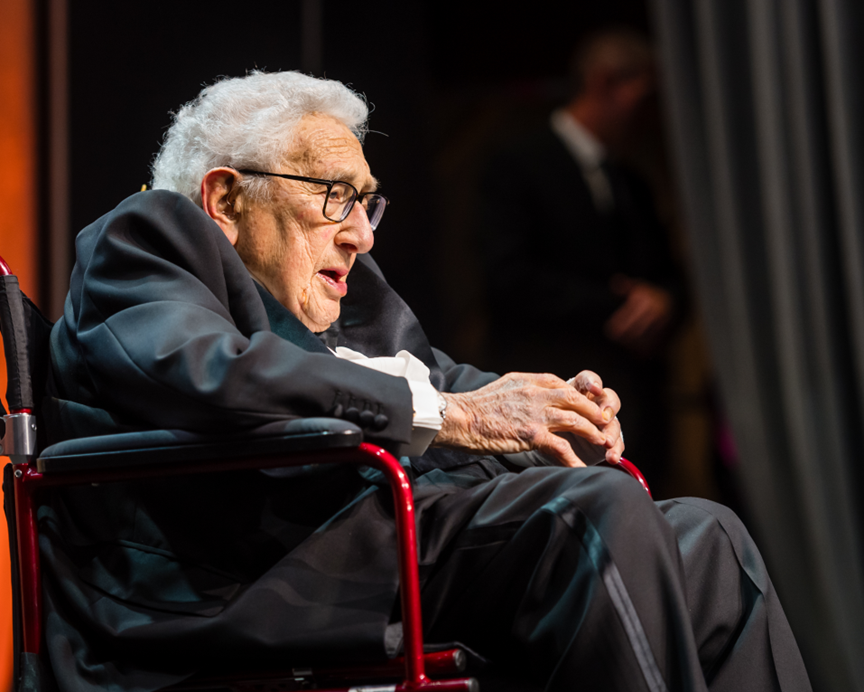
Speech by Kissinger
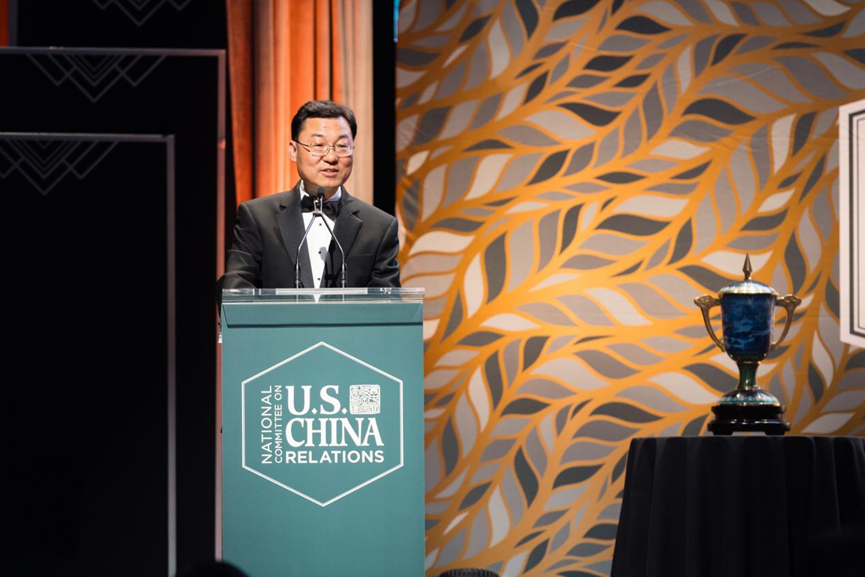
Speech by Xie Feng

Dialogue between Yao Ming and Tracy McGrady
The success of this U.S.-China People’s Dialogue has provided a valuable platform for cooperation and dialogue between the two countries, emphasizing the importance of humanistic exchanges and people’s dialogue in promoting common understanding and maintaining world peace. The two sides both repeatedly quoted President Xi Jinping’s words, “The foundation of China-U.S. relations lies among the people,” during his meeting with Mr. Bill Gates. At a time when the world is in the face of unprecedented changes with the downward world economy and prolonged geopolitical crisis, the world is counting on China and the United States to work together to address various challenges. As the largest developing and developed countries, China and the U.S. need to transcend bilateral differences, build a stable cooperation mode, and jointly explore solutions to international hotspots, so as to instill confidence in world peace and stability.
